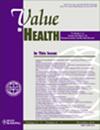Value Framework Based on Multiple-Criteria Decision Analysis for Assessment of New Health Technologies Under Universal Healthcare Coverage System in Taiwan
IF 4.9
2区 医学
Q1 ECONOMICS
引用次数: 0
Abstract
Objectives
Given the lack of a value framework for assessing health technologies in Asian settings, a value framework incorporating multiple-criteria decision analysis for new drugs under universal healthcare coverage in Taiwan was established.
Methods
The development process included (1) the adoption of 5 value domains (ie, Overall clinical benefit, Disease burden, Alignment with patient concerns, Economic value, and Feasibility of adoption into the health system) and 26 corresponding indicators, derived from the literature and expert discussions; (2) the creation of separate weighting schemes for 3 drug types—new oncology, new orphan, and other new drugs—based on inputs from multiple stakeholders (n = 86) using various weighting methods; and (3) the application of the value framework to cases of new oncology drugs.
Results
Overall clinical benefit had the highest preference weight, irrespective of drug type, (ie, mean values [95% CIs] for new oncology, new orphan, and other new drugs: 32.5 [30.4–34.6], 30.6 [28.1–33.1], and 30.6 [28.7–32.6], respectively), weighting method, and stakeholder type. The 5 domain-derived weights (from the point allocation method) were comparable to the 26 indicator-derived weights (from the direct rating method), suggesting that the value framework with a short-form (domain-derived) weighting scheme is sufficient to support decision making under time and resource constraints.
Conclusions
A country-specific value framework incorporating multiple-criteria decision analysis for new drugs was developed in an Asian setting under universal healthcare coverage. It allows multiple stakeholders to systematically appraise all drug value attributes and provides a structured process for adapting and refining value assessments.
基于多准则决策分析的台湾全民健保新技术评估价值架构。
目的:考虑到亚洲地区缺乏评估医疗技术的价值框架,本文建立了台湾全民医疗覆盖下新药多标准决策分析(MCDA)的价值框架。方法:制定过程包括:1)采用5个价值域(即“总体临床效益”、“疾病负担”、“与患者关注的一致性”、“经济价值”和“纳入卫生系统的可行性”)和26个相应指标,这些指标来源于文献和专家讨论;2)基于多个利益相关者(n=86)使用各种加权方法的输入,为三种药物类型(新肿瘤药物、新孤儿药和其他新药)创建单独的加权方案;3)价值框架在肿瘤新药案例中的应用。结果:无论药物类型(即新肿瘤药、新孤儿药和其他新药的平均值[95%置信区间]分别为32.5[30.4-34.6]、30.6[28.1-33.1]和30.6[28.7-32.6])、加权方法和利益相关者类型,“总体临床获益”的偏好权重最高。5个领域衍生权重(来自点分配法)与26个指标衍生权重(来自直接评级法)具有可比性,表明具有简短形式(领域衍生)权重方案的价值框架足以支持时间和资源约束下的决策。结论:在全民医疗覆盖的亚洲环境中,开发了一个包含新药MCDA的国家特定价值框架。它允许多个利益相关者系统地评估所有药物价值属性,并提供一个结构化的过程来调整和改进价值评估。
本文章由计算机程序翻译,如有差异,请以英文原文为准。
求助全文
约1分钟内获得全文
求助全文
来源期刊

Value in Health
医学-卫生保健
CiteScore
6.90
自引率
6.70%
发文量
3064
审稿时长
3-8 weeks
期刊介绍:
Value in Health contains original research articles for pharmacoeconomics, health economics, and outcomes research (clinical, economic, and patient-reported outcomes/preference-based research), as well as conceptual and health policy articles that provide valuable information for health care decision-makers as well as the research community. As the official journal of ISPOR, Value in Health provides a forum for researchers, as well as health care decision-makers to translate outcomes research into health care decisions.
 求助内容:
求助内容: 应助结果提醒方式:
应助结果提醒方式:


